Trinity Welcomes Seven New Tenure-Track Faculty Members
With areas of scholarship that include global nuclear politics, mass incarceration, the U.S. Supreme Court, and astronomy, seven new tenure-track faculty members join Trinity College this fall.
Some of the faculty members are coming to Trinity from institutions where they held tenure-track positions. They arrive with experience as fellows, authors, researchers, organization trustees, and scholar advocates.
“All are creative, highly engaged teachers committed to excellence, and we are very excited to welcome them to campus,” said Sonia Cardenas, dean of the faculty and vice president for academic affairs. “They have a range of talents and perspectives that they bring to Trinity in their new roles, benefitting both our students and larger academic community.”
The new tenure-track faculty started July 1, 2024. They are: Lucius Couloute, sociology; Nadja Eisenberg-Guyot, anthropology; Shane A. Gleason, public policy and law; Sidra Hamidi, political science; Robbert J. Langwerden, psychology; Betül Mutlugün, economics; and Eyal Schwartz, physics.
Read more about them below.
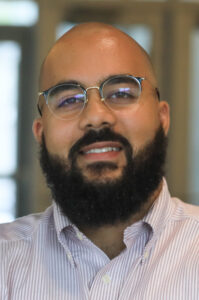
Lucius Couloute, Assistant Professor of Sociology
Ph.D., University of Massachusetts Amherst
M.A., University of Massachusetts Amherst
B.A., University of Massachusetts Amherst
Originally from Hartford, Couloute is looking forward to working in the city that he has always called home. “Bringing together my familiarity with the area, my Hartford-based research, and the curiosity of budding undergraduate scholars should make for stimulating and enjoyable classroom experiences,” he said. “I am also excited about Trinity’s lively and growing academic community. I expect that this will be the perfect place to further develop my scholarly portfolio and continue working on local policy initiatives that impact lives in and around the Hartford area.”
Much of Couloute’s work examines systems of inequality and related solutions. In particular, he explores the causes and consequences of mass incarceration. “My work helps to counter the unfounded myths we all learn about why people end up in prisons and how they fare afterward—something that students tend to appreciate,” he said. “For example, we are often taught that there are victims and there are criminal offenders. My research suggests that the line between the two are often blurry at best, and that listening to the voices of those with lived criminal-legal experiences can help us better address the many issues that mass incarceration creates.”
Couloute is the current president of the Board of Directors for the Prison Policy Initiative, a national non-profit criminal justice research and advocacy organization. He previously served as assistant professor of sociology and criminal justice at Suffolk University.
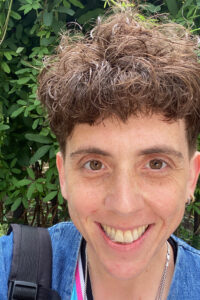
Nadja Eisenberg-Guyot, Assistant Professor of Anthropology
Ph.D., City University of New York, Graduate Center
M.A., City University of New York, Graduate Center
B.A., University of Pennsylvania
Eisenberg-Guyot is an abolitionist organizer and scholar whose work focuses on how trans and cis working-class women who use drugs envision alternative models of healing, justice, substance use, and care.
They connect strongly with Trinity’s commitments to community-based learning and service to Hartford’s communities. “I am excited to work closely with students and community members to develop new avenues of research that speak to the social, cultural, and political visions of Hartford’s diverse communities,” Eisenberg-Guyot said. “I am looking forward to collaborating with students to cultivate classrooms full of experimentation, risk-taking, and intellectual transformation grounded in practical engagement with the ever-changing world around us.”
Eisenberg-Guyot’s work contributes to emergent conversations about how popular criminal legal system reforms can end up expanding, rather than reducing, the scope of surveillance, policing, and incarceration and exacerbating their gender-, race-, and class-based effects. “As young people confront a world shaped by capitalist-driven climate crisis, genocide, legislative attacks on the bodily autonomy of trans youth and pregnant people, and the criminalization of homelessness and student protest, I hope my scholarship provides tools for challenging and confronting state violence in the lineage of anti-imperialist, feminist struggle and space to dream abundant futures of repair and social justice,” they said.
Before joining the Trinity community, Eisenberg-Guyot was a postdoctoral fellow in sociomedical sciences at Columbia University’s Mailman School of Public Health and a Pen America Writing for Justice Fellow.
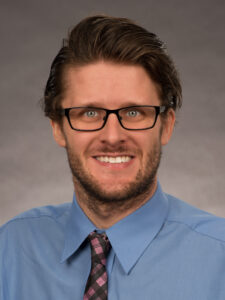
Shane A. Gleason, Associate Professor of Public Policy and Law
Ph.D., Southern Illinois University
B.A., Cleveland State University
Gleason sees making a positive impact on the world as the ultimate purpose of education. “Because of that, I am thrilled to join a vibrant community where the liberal arts meet the real world,” he said. “Trinity is an environment where I can engage in great scholarly conversations with students and colleagues alike. It is also a place where I work collectively with my colleagues to prepare students to head into the world to lead transformative lives. I consider myself very fortunate to be a part of this community. I am so excited for the class discussions, and I am positive we will all learn a lot from each other.”
His research begins with the premise that the personal is political. “Who we are, on multiple levels, impacts how we experience the social and political world,” Gleason said. “While I specifically look at this via the role sex and gender play at the U.S. Supreme Court, the question of identity permeates everything from major political decisions to the mundane of daily interactions. Needless to say, we are all impacted by identity. Identity politics is something students—and everyone—will experience on some level.”
Gleason was previously associate professor of political science at Texas A&M University-Corpus Christi and is the co-author of Constraint and Policy Change: Courts and Education Finance Reform (SUNY Press, 2021).
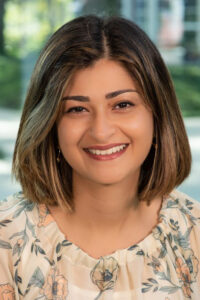
Sidra Hamidi, Assistant Professor of Political Science
Ph.D., Northwestern University
M.A., University of Chicago
B.A., North Central College
“There is much renewed public interest and even pop culture attention on nuclear weapons and history,” said Hamidi, whose research and teaching interests are in nuclear politics and diplomacy. She will teach a course on global nuclear politics with a focus on nuclear weapons development, and on the broader contribution of nuclear technology to the construction of the contemporary international system.
“I find that students are particularly interested in understanding the historical origins of nuclear technology, the entanglement of science and politics, and the future of nuclear technology in combating climate change,” Hamidi said. “The study of nuclear politics goes beyond conventional security topics such as mutually assured destruction—which is nonetheless still important—to debates that are timely and vital.”
Hamidi said she was particularly drawn to Trinity by its dynamic and diverse community and because of its commitment to both research and teaching. “The students display an intrinsic motivation toward education and broadening their own worldview,” she said.
Prior to coming to Trinity, Hamidi was a Stanton Nuclear Security Postdoctoral Fellow at Stanford University’s Center for International Security and Cooperation and previously taught at Eckerd College and Stetson University in Florida. Her book, After Fission: Recognition and Contestation in the Atomic Age, is forthcoming from Cambridge University Press and explores the politics of being recognized as a nuclear or non-nuclear state, with a focus on Israel, India, Iran, and North Korea.
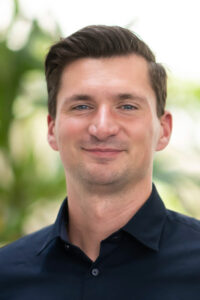
Robbert J. Langwerden, Assistant Professor of Psychology
Ph.D., Radboud University, Netherlands
M.S., Radboud University
B.S., Radboud University
Langwerden’s research areas include mental health and health disparities, minority health, clinical psychology, dimensional psychopathology, psychological assessment, and personality psychology. At Trinity, he hopes to pass on to students his enthusiasm for psychology and the scientific process. “I look forward to encouraging students to follow their interests, ask questions about any aspect of those interests, and apply science to attempt to answer questions they are interested in, whether within psychology or across disciplines,” he said.
In his courses, Langwerden will incorporate applied and real psychological science aimed at improving lives, reducing suffering, and better understanding psychological processes for the sake of equity. “The research I strive to do involves consideration of individual factors, such as identities, and environmental factors,” he said. “I think and hope this will resonate with students because it considers a holistic view of the person. Nuanced perspectives can be a humanistic way to understand how people learn, feel, and behave.”
The research that he aims to do is community-engaged and is informed by and for community members. Langwerden said, “Examples of such research projects are to assess the mental health needs of Trinity’s students—with a focus on international and multicultural students—and more broadly, assess the needs among Hartford’s underserved communities.”
Langwerden was previously a postdoctoral associate at Boston University’s Center for Anxiety & Related Disorders.
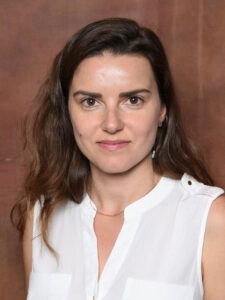
Betül Mutlugün, Assistant Professor of Economics
Ph.D., Istanbul University, Turkey
M.Sc., Istanbul University
B.A., Istanbul University
“Economics requires open minds that can approach issues from various perspectives,” said Mutlugün. “Trinity’s liberal arts tradition provides the perfect setting for my interest in teaching courses that introduce diverse perspectives in macroeconomics.”
Mutlugün is looking forward to engaging with students from diverse backgrounds and guiding them to become critical thinkers who can apply their knowledge to address complex economic issues. “I’m thrilled to contribute to Trinity’s dynamic academic environment by teaching economics courses that blend theory with practical applications, demonstrating the real-world relevance of what students learn,” she said.
Her research on international finance, financialization, and income inequality addresses the complexities of the modern global financial system. “Many of the key issues of our time are financial instability, trade wars, and economic inequality,” Mutlugün said. “As the 2008 financial crisis shows us, financial logic permeates every aspect of economic activity in our digitized economy, affecting everything from worker income to global economic stability. These topics are particularly relevant in today’s interconnected world, where college students are eager to understand how economic policies and international financial systems affect their own lives and future careers. By adopting a theory-driven empirical approach, I provide students with the tools to understand and analyze these critical economic challenges.”
Before coming to Trinity, Mutlugün was previously a visiting scholar at the Marshall School of Business Department of Finance and Business Economics at the University of Southern California.
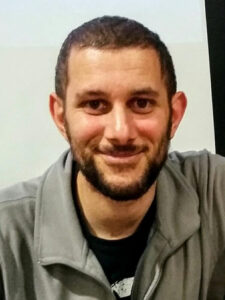
Eyal Schwartz, Assistant Professor of Physics
Ph.D., Israel Institute of Technology
M.Sc., Israel Institute of Technology
B.A., Israel Institute of Technology
For Schwartz, the greatest appeal of coming to Trinity is the ability to teach small groups of students, allowing him to personalize his teaching and dive deep into many thought-provoking discussions. “Trinity College offers me a unique opportunity to be faculty at an intimate and thriving liberal arts institute,” he said. “Physics studies is an enthralling marathon that requires patience, hard work, and enthusiasm—both from students and faculty. The reward is the understanding of the fundamental principles of nature and their application to real-world phenomena.”
With research areas that include precision measurements techniques, experimental gravitational waves physics, atomic physics, optics, and astronomy, Schwartz says that physics is the foundation of the natural sciences—from small-scale quantum particles to galaxies. “In physics, we encourage and teach students to develop deep analytical skills that will benefit them whether they wish to pursue an academic path or work in the industry,” he said. “As physicists, they will be knowledgeable about the basic building blocks of nature, which will allow them to communicate with experts in many other fields in science and engineering—a skill vital today.”
Schwartz is currently a member of the LIGO Scientific Collaboration and was previously a postdoctoral research associate in the Gravity Exploration Institute at Cardiff University, U.K. He also is a former postdoctoral fellow at LIGO Livingston Observatory in Louisiana, the University of Mississippi, and the University of Otago in New Zealand.
